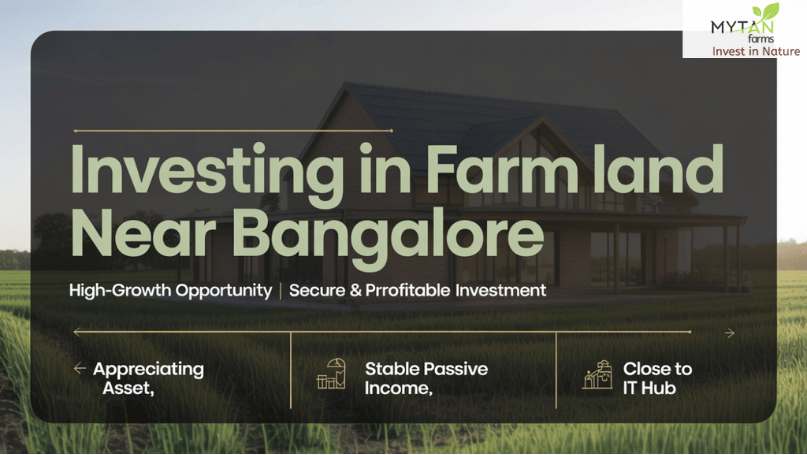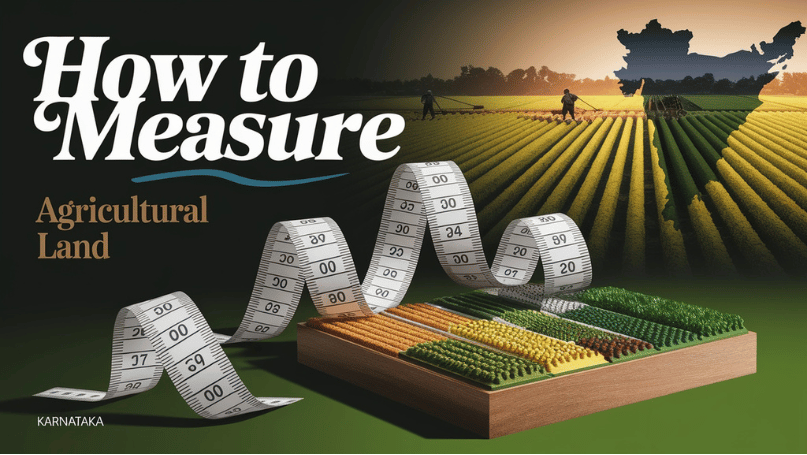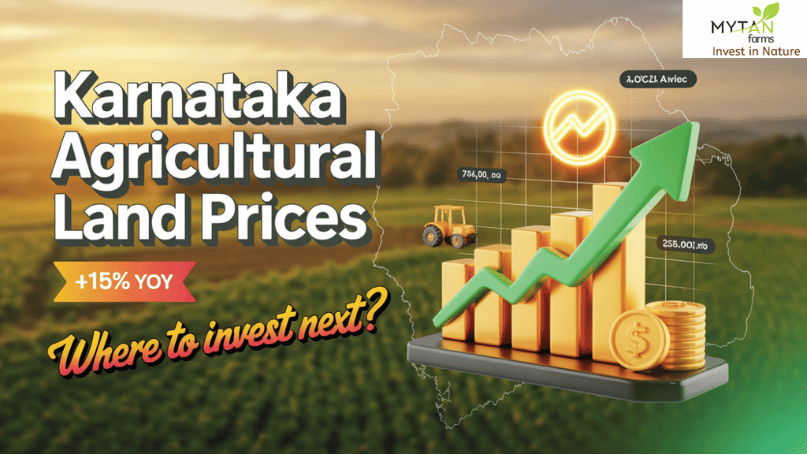 Introduction
Introduction
Karnataka is one of India’s leading agricultural states. Rice, sugarcane, cotton, and coffee are among the many crops grown here. Agriculture derived a large portion of Karnataka’s economy and the livelihoods of many families. Agricultural land in Karnataka prices have been rising in recent years. Farmland is becoming increasingly popular as a smart investment option.
In this blog, we will examine the historical trends in land prices, current events and future projections. This will help readers know whether purchasing agricultural land in Karnataka is a smart action or not.
Karnataka’s Agricultural Land Market – The Big Picture

Karnataka agricultural land covers about 99 lakh hectares. This land is spread across 10 different farming zones, each with its soil and weather. For example, Kalaburagi is well-known for its tur dal, while Kodagu and Chikmagalur are known for their coffee and spices.
In recent years from 2020-2025 the cost of agricultural land increased because more people are leaving their land behind and relocating to cities, and others view farmland as a smart investment.
In Karnataka, an acre of farmland currently costs between Rs 30 lakh to 40 lakh on average. Different areas in Karnataka agricultural land grow different crops, such as coffee, spices and pulses are grown in different regions. The future of farming in Karnataka is being shaped by these shifts in land prices and use.
Historical Price Analysis (2015-2025)
The majority of Karnataka’s districts saw increases in the price of agricultural land in Karnataka between 2015 and 2025. The greatest growth was observed in areas close to cities like Bengaluru, Mysuru, and Tumakuru.
Prices increased gradually but consistently in rural areas like Bagalkot and Raichur. The COVID-19 pandemic in 2020, the demonetisation in 2016, and the GST in 2017 all had a brief impact on land sales.
However, after each event, prices swiftly recovered. Hence, as a secure investment, people began making more land-related investments. Because of their excellent roads, water supply, and proximity to cities, some areas showed a strong recovery.
To put it simply, Karnataka’s land prices have increased significantly over the past 10 years.
Regional Price Analysis
The cost of agricultural land in Karnataka varies by region. Because Bengaluru, Mysuru and Mangaluru are close to cities and have good roads, the prices are high there.
Prices are lower but are gradually rising in northern regions like Bidar, Bagalkot, and Raichur. Because of tourism and green space, coastal regions like Udupi and Uttara Kannada also have higher costs.
Southern Karnataka has moderate prices and good soil for farming. Overall, land near cities and with better water or roads costs more.
Value Determinants for Agricultural Land
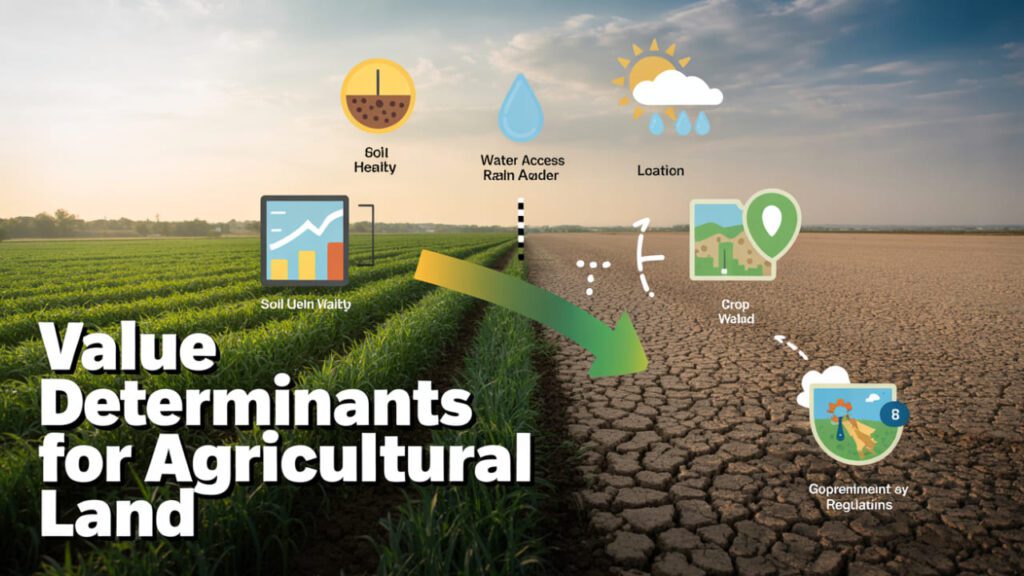
- The availability of water and access to irrigation
- More value is placed on land that has canals, borewells or rivers close by.
- Farmers favour cropland with a consistent supply of water.
- Crop suitability and soil quality
- Better crop results come from fertile soil.
- Soil types vary depending on the crop (e. g. black soil for cotton).
- Access to markets and road connectivity.
- Property close to a highway or a village road sells more quickly.
- Farmers can sell crops more quickly when markets are easily accessible.
- Proximity to urban centres
- Prices are higher for land close to cities or industrial areas.
- Future non-farm development can make use of it.
- Electricity infrastructure.
- It is more beneficial to have land with power for pumps and motors.
Legal Framework Affecting Land Prices
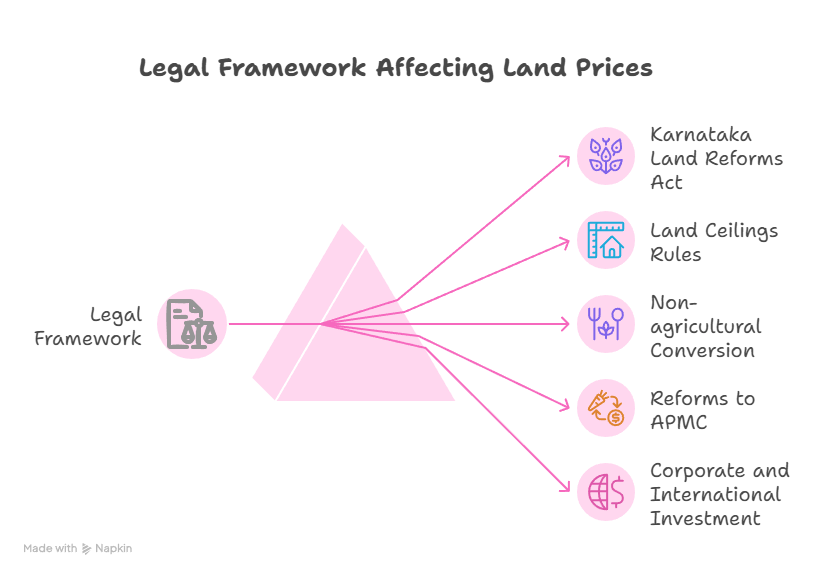
- Karnataka Land Reforms Act
- Agricultural land in Karnataka can only be purchased by farmers.
- Who can purchase and sell farmland is governed by this law.
- Land Ceilings rules
- One person can only own a certain amount of land.
- The government may seize more land.
- Non-agricultural conversion
- Land that is used for farming must be converted to homes or factories.
- Time, money and approvals are required for this process.
- Reforms to APMC.
- Crops can now be sold by farmers outside of official markets.
- Land value close to private markets has increased as a result.
- Corporate and international investment.
- Foreign corporations find it difficult to purchase farmland due to strict regulations.
Investment Analysis by Land Type
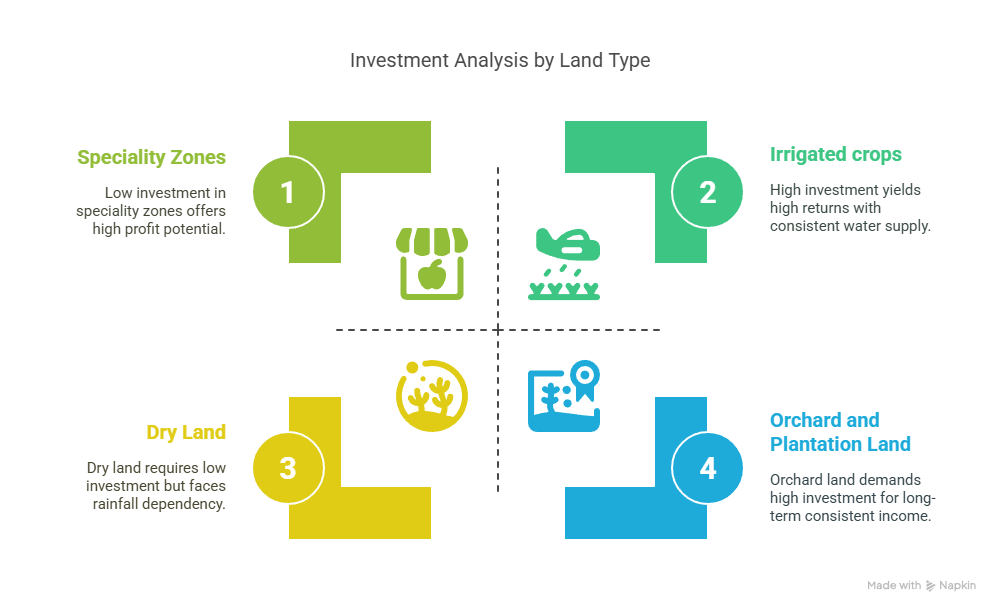
- Irrigated crops
- Provides greater returns due to a consistent supply of water.
- Ideal for high-value crops such as vegetables and sugarcane.
- Higher ROI Return on Investment)
- Dry Land
- Less expensive, but the risk depends on rainfall.
- Beneficial for hard crops such as pulses and millets.
- Long-term value, if irrigation gets better.
- Orchard and Plantation Land
- Lands for coffee, coconuts and areca nuts are in high demand.
- Consistent income for a long time.
- Hilly and coastal regions are seeing price increases.
- Speciality Zones
- Profits are high in areas that grow fruits, flowers and silk.
- The government frequently backs these areas.
Future Price Projections (2025-2030)
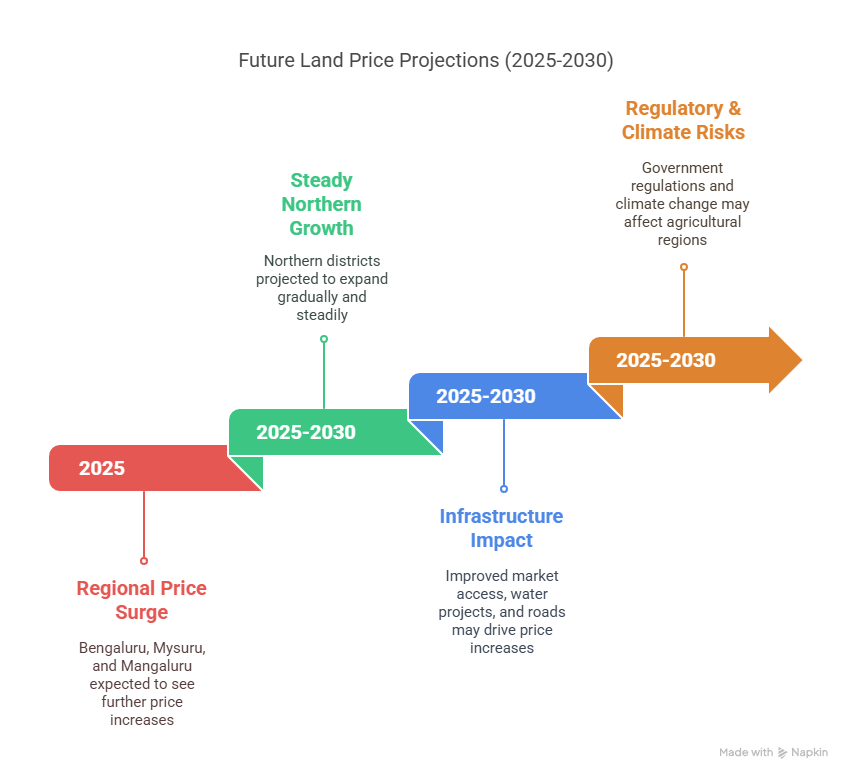
- Expert forecast by region
- Around Bengaluru, Mysuru, and Mangaluru, prices are anticipated to increase even more.
- Districts in the north may expand gradually but steadily.
- Factors affecting land prices
- Price increases may result from improved market access, water projectssand roads.
- Government regulations and climate change may affect agricultural regions.
- Risk Evaluation by Zone
- Zones with high rainfall or dryness are more dangerous.
- Long-term investments are safer in irrigated zones.
- Opportunities for the Investor
- Purchasing land close to a city or a highway can yield significant profits.
- Regular income can be found in plantation areas.
Emerging Trends Affecting Agricultural Land Values
- Climate change
- Crop productivity is impacted by unusual rains and droughts.
- If the weather worsens, some areas might become less valuable.
- Application of New Technologies
- Modern equipment, sensors and drones all contribute to better farming.
- Tech-friendly properties might be appreciated.
- Growth in green and organic farming
- The value of land used for chemical-free farming is higher.
- Clean, nutritious produce is more expensive.
- Governmental regulations
- New regulations or subsidies for farming may raise the demand for land.
- Support for cold storage and solar pumps is also beneficial.
- Large-scale infrastructure developments
- Nearby roads, airports and marketplaces raise the value of the land.
Buyer’s Guide to Karnataka Agricultural Land
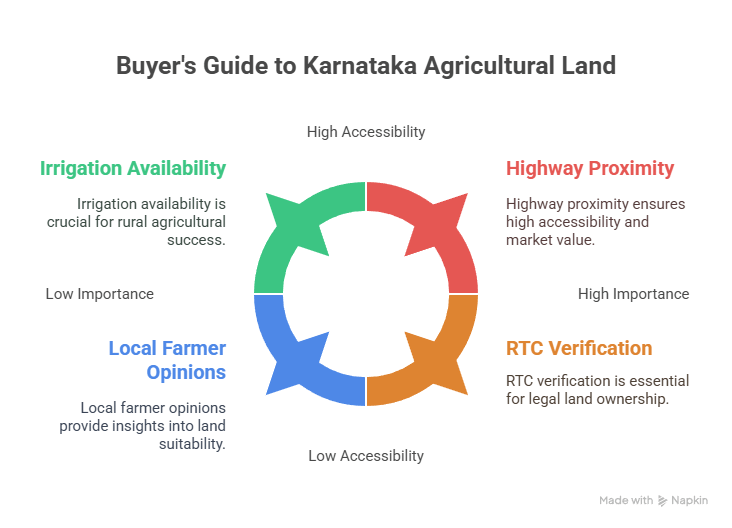
- Due Diligence Procedure
- Check the soil water and road accessibility when you visit the location.
- Ask local farmers for honest opinions.
- Check the document
- Check the RTC (Record of Rights) mutation records and land title.
- Verify that no loans or legal issues exist.
- Regional factors
- Prices are higher close to highways and cities.
- Look for market accessibility and irrigation in rural areas.
Before bargaining, always check the local market rate to avoid overpaying. In less popular or remote areas, land prices are usually more flexible. After buying, legally register your name, put up a fence, and begin basic work like cleaning and soil testing.
Conclusion
In Karnataka agricultural land is turning into a smart and well-liked investment. Prices are predicted to continue to rise particularly in Bangalore and Mysore after increasing steadily between 2015 and 2025. Market accessibility roads, soil and water all have a significant impact on land value.
Climate change and legal regulations also have an impact on land prices. Pay close attention to the paperwork, visit the location and learn about the local market if you intend to purchase land.
Investing in agricultural land in Karnataka can offer positive long-term returns with careful planning and investigation. It is a worthwhile and secure asset for the future.
Frequently asked questions
- How do agricultural land prices in North Karnataka compare to those near Bangalore in 2025?
Because Bangalore is growing and has good roads, land near it is more expensive. Prices in North Karnataka are lower but are gradually rising. Due to its lower rates and growth potential, North Karnataka is preferred by investors.
- What are the legal requirements for purchasing agricultural land in Karnataka if I’m not a farmer by profession?
Before, only farmers were able to purchase agricultural land. Non-farmers can now purchase as well, provided the land is not subject to government restrictions. Before purchasing, however, review the Karnataka Land Reforms Act and consult a lawyer..
- Which regions in Karnataka show the most promising agricultural land appreciation rates for the next five years?
High growth is evident in the areas close to Bengaluru, Mysuru and Mangaluru. Kodagu and Chikmagalur, two plantation zones, are also reasonably priced. Roads, marketplaces, and water sources will probably be more appreciated.
- How has climate change affected agricultural land values across different regions of Karnataka?
Droughts and erratic rains are results of climate change. While locations with improved weather stability and water management are attracting more buyers and investors arid areas may lose value.
- What documentation should I verify before finalising agricultural land in Karnataka?
Verify the land title encumbrance certificate mutation records and RTC (Record of Rights). Verify that the land is free of loans and court cases. An official or attorney in the area can assist in correctly verifying all documents.

